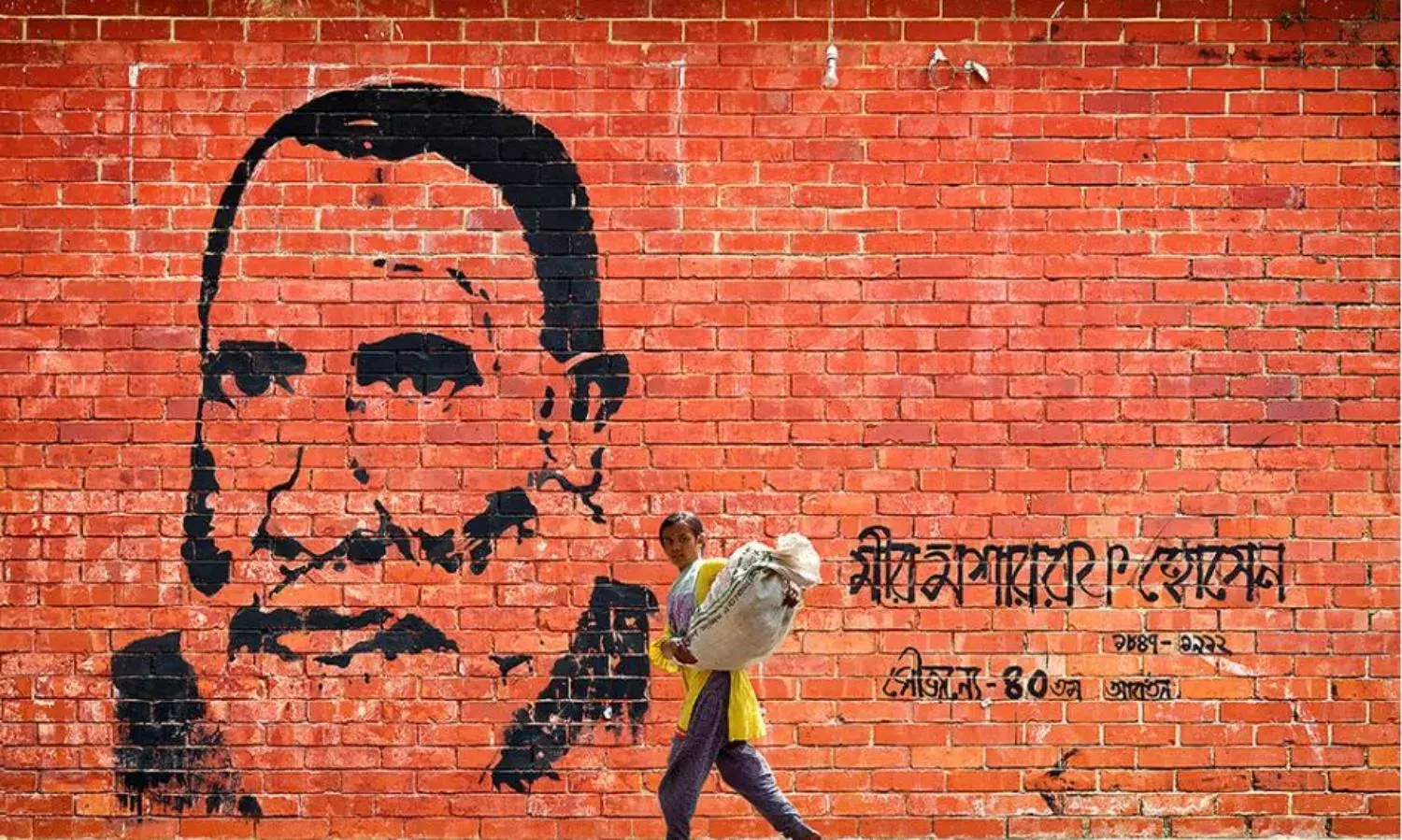A Bengali Epic about a Mesopotamian Tragedy
Mir Hossain's Ocean of Melancholy
Bishad Sindhu is a work of fiction based on the tragedy of Karbala that took place in the 7th century during Muharram, the first month of the Islamic calendar.
The epic novel, by Mir Mosharraf Hossain, has been a favourite of both Hindu and Muslim Bengali readers ever since it was first published in 1885.
It remains in print in multiple editions and is popular among urban intellectuals and rural folks alike. In the cities countless readings from the print edition are still held, especially during Muharram, and parts of the book continue to inspire stage performances including music and dance.
According to Urdu and Persian texts and information received from oral historians, Husain, younger grandson of Muhammad, the Prophet of Islam was martyred in Karbala, a city on the banks of River Euphrates in the deserts of modern day Iraq, in 680. It was in Muharram, on the 10th day of the month that Husain was beheaded. The anniversary of that tragic incident falls this year on September 21, and mostly devout Shia Muslims all over the world will once again participate in commemoration rituals like in previous years.
Bishad Sindhu is Bengali literature’s first modern novel and Hossain is remembered as a very brave writer. Brave because he wrote at a time when the colonial government had restricted freedom of speech in the country, and the attitude of most readers smacked of orthodoxy. Hossain was even taken to task by conservative Muslims for having dared to use his imagination to fictionalise the sacrosanct memory of Hasan and Husain, grandsons of Prophet Muhammad. However, his admirers love his imaginative take on history.
Hossain was even accused of blasphemy and this broke his heart. He resented the petty attitude of his contemporaries. Prolific as he was, Hossain was often at a loss for words over the degree of ignorance and superstition displayed with such pride by some of his fellow Muslims.
Born into a family of landlords in 1847 in what is now Bangladesh, Hossain enjoyed a lush literary career. He was forced to drop out of formal studies but went on to read and write voraciously. A healthy body of his work has survived all criticism from conservative Muslims and the establishment of the day, and remains popular to this day. Hossain continues to be admired for his liberal and non-communal legacy, and his progressive ideas have inspired several generations of writers.
In his writing Hossain elevates the tragedy faced by Muhammad's descendants so long ago to a universal fight for justice by concerned and compassionate human beings everywhere in the world.
In fact his work is a rich documentation of the follies and vices of contemporary society.
When the unreasonable aggression of Hanafiyyah had gone on for a while, there was another oracle, 'Muhammad Hannafiyyah, you will be punished for your sin-for killing innocent creatures who have done no wrong, for wounding people when war is over. Till doomsday, you and your horse will be imprisoned in a vault of stone!'
In his lifetime Hossain found a wonderful ring to the word liberty. While India was in the clutches of colonialists, Hossain dreamt of liberty, and of a country free from colonial control. He has incorporated his dream of a free and fair society into Bishad Sindhu, a novel ostensibly about people and incidents from another era but with similar aspirations of equality, universal brotherhood and goodwill for all human beings.
This is the power of Hossain’s writing. The writer derives strength from taking a memory so close to the heart of millions of devotees despite being more than a thousand years old, to give it contemporary context. Hossain highlights injustices faced by historical characters only to point out how unfair human affairs remain.
Hossain's main interest in writing about the tragedy of Karbala, and in keeping the past alive is not to forget inhumanity so rampant also in the present. He liberally sprinkles the main story of Karbala with his own views on good governance, greed and morality based on injustices that he experienced around him.
However, let me take his opportunity to speak a little about the social ills of the Muslim dowry (maharana) system of our time. Today, in India, lakhs and lakhs of rupees have to be given by the Muslim grooms to their brides.
Unfortunately, British law supports the arrangement.
Hossain tells the story of Karbala in Bengali but his mother tongue is further enriched with a grand mixture of Sanskrit and Persian vocabulary. The 19th century Sanskrit scholar Hariprasad Shastri praised Bishad Sindhu in 1887, declaring it as one of the best works in the Bengali language.
Hossain’s Karbala story is loved by rural folks as well who have been inspired by the text to compose many songs of lamentation, called jaari gaan in Bengali for crooning during Muharram.
Today this book most beloved of Bengalis has a brand new translation into English, Ocean of Melancholy by writer and poet Alo Shome.
It is the second translation of Bishad Sindhu into English. Bangladeshi professor of English literature Fakrul Alam’s Ocean of Sorrow was published two years ago. Yet another translation of Bishad Sindhu into English is a great opportunity to introduce the work of Hossain beyond the boundaries of Bengali readers.
(Cover Photo: Graffiti depicting Mir Mosharraf Hossain on a wall. Photo by Sabbir Khan)





